#býleistr
Photo
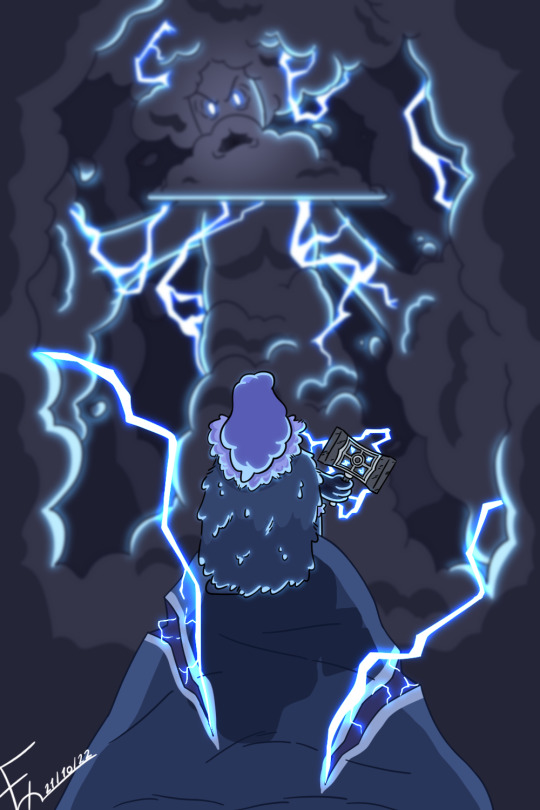
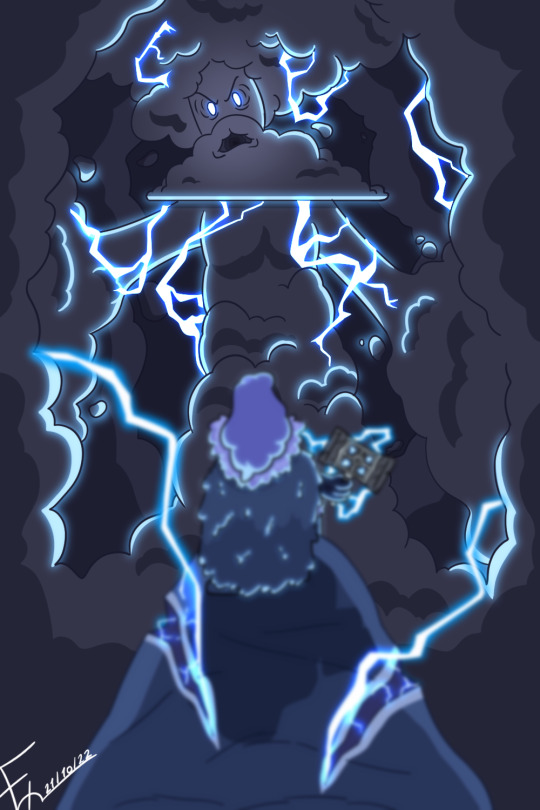

The fall of thunder
This is a depiction of Thor fighting the former owner of the lightning herald hammer Mjölnir, Býleistr.
After that, Thor also gained the ability of Býleistr to turn into a weather spirit and with that, was named the god of thunder
#hilda#hilda fanart#hilda netflix#hilda the show#hilda the series#hilda and the all-mother#hilda and the allmother#hilda au#au#alternate universe#original character#oc#byleistr#býleistr#thor#thor odinson#mjolnir#mjölnir#ancient giant#ancient giant hilda#weather spirit#weather spirit hilda#hilda weather spirit#god of thunder#lightning#exjr original
27 notes
·
View notes
Text
Loki Deity Guide
Loki’s mythology is not as chaotic as you may think…
It’s even more chaotic than that!

Who is Loki?
Often referred to as the Trickster God of the Aesir, Loki is actually the son of Fárbauti a giant, or a Jötunn, and Laufey, who was said to be a goddess. Though Loki is often referred to using he/him pronouns, can change his shape and gender at will.
While many of the old stories involving Loki paint him in a negative light, the same cannot be said for Loki’s modern followers.
Parents and Siblings
Fárbauti (Father)
Laufey (Mother), sometimes referred to as Nál.
Býleistr (Brother)
Helblindi (Brother)
Lovers or Partners
Sigyn (Wife)
Angrboda (Lover)
Children
Nari or Narfi (from Sigyn)
Hel (From Angrboda)
Jörmungandr (From Angrboda)
Fenrir (From Angrboda)
Sleipnir (From Svadilfari)
Epithets
Loptr (Old Norse meaning “Air”)
Hveðrungr (Roarer)
Contriver of all fraud
Shape-Changer
Sly-One
Wizard of Lies
Thief of Giants
Evil Companion
Kinsman of Sleipnir
Foe of the Gods
Forger of Evil
Contriver of Baldr’s death
Wrangling Foe of Heimdallr
Notes
Loki was known to be mischievous and at times malicious, but he was also rather helpful in many stories.
At some point Loki’s name became conflated with Logi, meaning “fire”, however, Logi is a separate being and is the Nordic personification or god of fire. Many blame Richard Wagner for this mix-up.
It is also possible that Loki’s name means “knot” or “tangle”.
It has been debated whether or not the Finnish "Lukki" (the name for a spider with thing, long legs) came from the same root as "Loki" ("luka" the proto-germanic word for "lock") but this is not a very popular belief and there is very little evidence to back it up.
Though Loki is part Jötunn, he is seen as part of the Aesir.
My personal favorite story of Loki is Þrymskviða, in which Loki and Thor disguise themselves as women in order to get Thor’s hammer back.
Sleipnir, Loki’s son, is an eight-legged horse that came to be when Loki had to transform into a mare in order to drive away the great stallion, Svadilfari. While Loki was in the form of a mare, the two came together to create Sleipnir who was said to be the fastest and best horse in all of the nine realms. Odin eventually chose Sleipnir as his steed.
One of the most popular tales involving Loki gets its namesake from the god, the Lokkasenna.
Loki ends up punished by the Aesir for either killing Baldr or for the events that take place in Lokkasenna. He is bound in a cave by the intestines of one of his offspring, his son Nari is turned into a wolf, and a venomous snake is placed above his head and drips venom into his eyes. Sigyn holds a shell above his head to protect him from the venom but every so often needs to empty the shell and the venom drips into his eyes once more.
In myth, it is said that Ragnarök will begin when Loki breaks free from his bondage.
Loki has been conflated with Lugh, the Irish deity due to their similar prankster and chaotic nature as well as the slight similarity of their names.
Modern Deity Work
There is no evidence that Loki had a cult or large following until modern times, so many of these correspondences, offerings, etc are going to be based on Loki’s mythology and current Lokeans’ posts.
Correspondences
Rocks/Stone/Crystals
Bloodstone
Opal
Opalite
Pyrite
Herbs/Plants
Cinnamon
Birch (Loki is mentioned in the Norwegian Rune poem for Berkano/a, or Birch)
Dragon’s Blood
Mistletoe
Bentgrass “Loke’s Grass”
Dandelion “Loke’s Bloom”
Haircap Moss “Loke’s Oats”
Animals
Snake
Horse
Wolf
Spider
Salmon
Fly
Symbols
Snake
Air
Feathers
Kuanaz (Rune)
Berkano (Rune)
Offerings
Sweet foods
Sour foods
Cinnamon
Chocolate
Alcohol
Meat charred to ash
Mead
Acts of Devotion
Offering your time to Loki
Trying to understand the misunderstood
Don’t be afraid to go against the grain
Keep in mind that these are only some ideas for offerings and correspondences! Items and activities that connect you to her in a more personal way are just as good, and often better, than those you find on the internet. As with any relationship, feel it out, ask questions, and be attentive and receptive!
References and Further Reading
Loki - Britannica
Loki - Wikipedia
Loki - Norsemythology.com
Loki - Mythopedia
The Poetic Edda - translated by Henry Adams Bellows (Via Sacred Texts)
Loki in Norse Mythology - World History Edu
Symbols for Loki - Lokeanwelcomingcomittee
Loki Devotees and Followers to check out:
@lokeanwelcomingcommittee
@skaldish
@the-fox-jawed-witch
@jasper-pagan-witch
@broomsick
@grumpylokeanelder
@elizatungusnakur
as suggested by the community <;3
695 notes
·
View notes
Text
LOKI
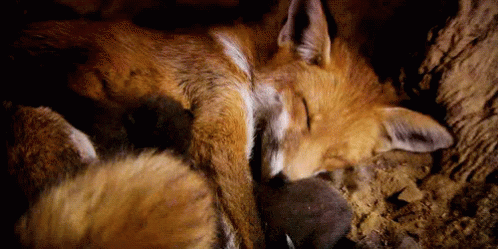
WHO IS HE?
Loki is the Norse God of mischief and trickery. He is known for his unpredictable and manipulative nature, which frequently involves playing practical jokes or pranks on other Gods, mortals, and giants. He is also the God of fire, and he has a strong connection to the underworld and the realm of the dead. Loki is often portrayed as a shapeshifter who can take on the form of various animals, including snakes, foxes, bats, and even horses. He is also often associated with fire, creativity, innovation, and destruction.
BASIC INFO:
Appearance: his appearance in Norse mythology can vary greatly, depending on the source. In some depictions, he is described as being a tall and handsome male figure with red hair and a beard. In other depictions, he is described as being a more feminine or androgynous character, with long and straight red hair, along with smooth and pale skin.
Personality: Loki is a clever and devious character, known for his ability to manipulate and deceive others with his cunning and wit. He is also known for his unpredictable nature, his tendency to get himself into trouble, and his proclivity for causing chaos and disorder. He is often seen as a trickster and a troublemaker, who enjoys creating disruption and chaos.
Symbols: serpents, wolves, ax, raven, masks, fire, Bjarken and Logr Runes, fishing nets, earthquakes, infinity snake and ouroboros, number 8, chaos star, runes that spell out his name: Laguz, Othala, Kenaz, Isa as well as the rune Hagalaz, and Helmet of Dread or the Helmet of Horror
God of: mischief and trickery
Culture: Norse and Germanic
Plants and trees: mistletoe, birch, common Haircap moss (Loki’s Oats), bentgrass (Loki’s Grass), cinnamon, dandelion, beech, blackthorn, elder, elm, ivy, juniper, mullein, thistle, mint, holly, cedar, juniper, elder, clove, patchouli, tobacco, willow, and yew
Crystals: jade, obsidian, sapphire, amethyst, garnet, citrine, black tourmaline, serpentine, carnelian, fire opal, and black onyx
Animals: salmon, birds (crows, ravens, falcon, and vultures), flies, goats, flea, horses, wolves, foxes, and spiders
Incense: dragon's blood, frankincense, myrrh, patchouli, and basil
Colours: green, gold, black, violet, yellow, orange, and red
Tarot: The Fool
Planets: Mercury and Venus
Days: Thursday, Friday, Lokablót, April Fool’s Day, Yule, Autumn Equinox, Samhain, Friday the 13th, the 13th of each month, and Lokabrenna Day
Parents: Fárbauti and Laufey
Siblings: Odin (blood brother), Helblindi, and Býleistr
Partners: Angrboda, Sigyn, and Svadilfari (a horse), and Glut
Children: Fenrir, Jörmungandr, Hel, Váli, Narfi, and Sleipnir (Odin’s horse)
MISC:
• Fire: Wagner combined Loki with Logi, the fire god, in his Ring Cycle. And ever since, Loki has been associated with fire and magic in pop culture. There are some very iffy pieces of evidence that Loki might have had some historical connection with fire (e.g., the Snaptun stone and medieval folklore about the Ash Lad) but the scholarly consensus is “Nope, blame Wagner.” That said, fire, with its dual roles of creation and destruction, enlightenment and passion, is a pretty potent symbol for Loki even if it doesn’t have a historical basis.
• Red hair: Loki’s hair colour is never mentioned in the lore, and there are some illuminated Icelandic manuscripts in which he is shown as a blond or brunette. The fire god mistake mentioned above probably popularized the redhead image. (Interestingly, Thor is canonically a redhead.)
• Fishing Nets: in Gylfaginning, Loki weaves a fishing net while on the lam and hiding from the Aesir. (The story kind of implies it’s the first fishing net, although Ran is also credited with inventing them elsewhere.) Loki turns into a salmon to escape but ends up being caught with his own creation,
• Earthquakes: the prose epilogue to Lokasenna claims that earthquakes are caused by Loki writhing in pain when Sigyn leaves to empty her venom-catching bowl.
• Masks: while Odin, not Loki, takes the name of Grímnir (the masked one) in the lore, masks are a fairly logical thing to associate with a shapeshifter.
FACTS ABOUT LOKI:
• Name: Loki is named after the Norse word "loki," which means "mischief maker" or "trickster."
• Role: in Norse mythology, Loki is known as a chaotic and mischievous figure who frequently causes problems for the God’s.
• Relationships: the son of the frost giant Fárbauti and the giantess Farbauti, and is the brother of the Goddess Hel.
• Origin: he is a Jötunn or giant who is the son of the Jötunn Fárbauti, which means "dangerous strike."
• Associations: Loki is connected to the realms of chaos and trickery and is often seen as a troublemaker and instigator of conflict.
• Connection to Thor: he is the half-brother of Thor, and has several encounters with the god of thunder. In one famous example, Loki tries to trick Thor into drinking a powerful liquor called "Módrunar," which causes him to become extremely drunk.
• Powers: he is a powerful deity with a wide range of abilities, including shapeshifting, sorcery, illusions, and knowledge.
• Association with Trickery: Loki is closely associated with the concept of trickery, often utilizing his skills as a master manipulator to cause trouble for the God’s.
HOW TO WORSHIP LOKI:
The best way to worship Loki respectfully is to approach him with sincere devotion and reverence. He is a god of mischief and chaos, so a certain level of humor is appropriate when working with him, but that doesn't mean you should take him lightly or treat his power with disrespect. To worship him respectfully, make an offering, either something tangible or a gesture like writing a poem or performing an act of mischief and chaos in his name. Be genuine and open in your intention, and don't be afraid to get a little mischievous yourself.
Some ways to worship Loki include:
• Doing things that embody his energy and traits, such as pranks or mischief
• Making offerings to him, whether physical or spiritual
• Creating a dedicated altar space
• Studying and researching Norse mythology, particularly his role in it
• Performing rituals and spell casting to seek his guidance and insight
• Meditating on his energy and listening for a response
• Performing acts of chaos and destruction
• Seeking to gain his protection through protection magic or rituals
HOW TO PRAY TO LOKI:
To begin, you can address him by name and say something like:
"Great God Loki, bringer of chaos and master of deceit, I come to you seeking guidance and destruction. I offer my heart and spirit and ask for your blessing in this pray.”
"Thank you, Great God Loki, for listening to my words and walking by my side on this journey. I leave this altar/ritual space in your hands, and I ask for your protection and mischief wherever I may go."
WHAT ARE SIGNS THAT LOKI WANTS ME TO WORK WITH HIM?
If your request to work with Loki has been accepted, here are some signs that you can look for:
• Feeling a strong attraction or draw to his energy or presence
• Having repeating thoughts or dreams about him
• Feeling drawn to chaos or chaos magic
• You’ll start seeing his name everywhere – in books, on TV, online, etc.
• There might be a sudden change in your life, an unexpected sometimes painful change
• It will seem someone is playing tricks on you, particularly when it comes to your spiritual spaces like your altar
• Be wary of fires that are started in random places
• You might see his symbols or signs everywhere you go including the snake, spider, runes like Hagalaz and Isa, the Chaos star, number 8 or Ouroboros
• The TV show Loki or Marvel character might start popping up everywhere (yes I believe Loki communicates through this guise because it’s a form we know and understand)
• You might already have a connection with Odin, Loki’s brother
• Spiderwebs will appear in your space – in the home, workplace, or vehicle
• Loki’s sacred animals will appear as signs to you including the horse, fly, spider, snake, salmon, vulture, wolf, fox, etc.
• Experiencing signs of change or transformation in your life
• Feeling a sense of rebelliousness or mischief within you
• A sense of giddiness, playfulness, and light-heartedness after praying to him or meditating on his energy.
• Feeling of warmth or presence in the air around you.
• An increased sense of creativity, spontaneity, and a general desire to explore and experiment.
• Feeling a connection with nature or animals in a new or stronger way than before.
• Experiencing unusual or unexpected occurrences that seem a bit too strange to be coincidental.
If your request to work with Loki has not been accepted, you may notice the following signs:
• A lack of vivid dreams or visions about Loki.
• A sense of confusion, uncertainty, or indecisiveness in regards to your connection with Loki.
• A feeling of unease or discordance in your relationship with Loki.
• A feeling of discord or disinterest in your spiritual practice with Loki.
• An overall sense of discomfort or dissonance, rather than a sense of harmony and ease.
Overall you need to be respectful of deities denying your request
OFFERINGS:
• Candles, especially black ones.
• Incense, a musky or mysterious scent would be appropriate.
• Red fruits or flowers.
• Gems or metals.
• Herbs such as dill, ginger, and mugwort.
• Art or poetry.
• Toys, such as the ones you used to play with as a kid.
• Acts of chaos, subversion, or mischief.
• Flowers: daisies, roses, and lilies.
• Crystals.
• Hanging mistletoe at Yuletide.
• Foods and drinks: sweet foods, alcohol, spicy rum, mulled wine, chocolate with nuts or funny names, spongecake, coffee or other caffeinated beverages, honey, and pastries.
• Knives and daggers.
• Doing something you’re scared of (safely).
• Cinnamon.
DEVOTIONAL ACTS FOR LOKI:
• Challenge authority figures and shake things up
• Break rules and defy expectations
• Live a life of surprises and twists
• Explore your trickster side and have some fun with your mischief
• Embrace the shadow-self
• Let your inner child out (if not heal them first)
• Don’t take yourself too seriously.
• Be the devil’s advocate.
• Speak the truth and uphold it. This also involves speaking your mind about politics and issues.
• Express yourself.
• Indulge in art or create art. (Loki loves it when people dive deeply into their creative fire. He also rewards them for it)
• Live life to the fullest.
• Light a candle for him the moment you wake up and during bedtime. (I personally found out that he likes red and green candle but if those are not available, white can suffice).
• Burn some incense (cinnamon, sandalwood and dragon’s blood are some of Loki’s favorites but if he tells you otherwise, it’s okay).
• Stop planning and just be in the moment.
• Embrace chaos (and make it your bitch, as Loki would say).
• Cultivate a sense of mystery and playfulness.
• Be unpredictable and keep your friends on their toes.
• Push your boundaries and experiment with your boundaries.
• Break the norm and be yourself.
• Adopt a prickly succulent baby or an abandoned animal. If you can’t adopt, volunteer in shelters or be a foster paw-rent.
• Collect toys that you will both enjoy.
• Play board or video games.
• Cook meals and eat with him (cook whatever meal catches your fancy and then eat at his altar).
• Hoard jokes, puns and memes (VERY IMPORTANT! Loki loves his humour but in good taste. He seems to dislike and would often refute humor made in bad taste like triggering and racist jokes).
IS IT SAFE TO EAT OR DRINK AN OFFERING I GIVE TO HIM?
Yes, it is generally considered safe to consume or drink offerings you give to Loki. The concept of eating or drinking offerings in worship is a way of bringing a deity's energy and power into your own body. Consuming or drinking an offering can strengthen your bond with the deity and help you gain their insight and guidance. However, it's important to be mindful of what the offering is and whether or not it is safe for consumption. Depending on the offering, it may be necessary to prepare it in a specific way in order for it to be safe to consume.
#fyp#fypシ#fypシ゚viral#fypage#fyppage#tumblr fyp#satanism#satanist#deity#deity work#deity worship#occult#norse mythology#germanic#loki#trickster#god
18 notes
·
View notes
Text
Kennings to Loki

Hail to the Bench-Mate of Óðinn and the Æsir
Hail to the Brother of Býleistr and of Helblindi,
Hail to the the Sly God,
Hail to the Visitor and Chest-Trapping of Geirrödr,
Hail to the Father of the Monster of Ván and of the Vast Monster, and of Hel, and Áli;
Hail to the Kinsman of Sleipnir
Hail to the Harmer of Sif's Hair
Hail to the Thief of the Giants, of the Goat, of the Brísingamen, and of Idunn's Apples;
Hail to the Husband of Sigyn,
Hail to the Slanderer and Cheat of the Gods,
Hail to the Contriver of Baldr's Death,
Hail to the Son of Fárbauti and Laufey, or of Nil,
Hail to the the Bound God
Hail to the Wrangling Foe of Heimdallr and of Skaði.


#prayer#heathenry#norse paganism#eddas#paganism#norse gods#deities#deity work#loki#spirituality#polytheism#norse polytheism#poem#kennings#prose edda
137 notes
·
View notes
Note
Let's Get ((REAL)) fic writer asks
🌈🎉🤍
🌈 is there a fic that you worked *really fucking hard on* that no one would ever know? maybe a scene/theme you struggled with?
I struggled the entire time trying to get through Ghosts That We Knew, the conclusion to the Picture Perfect series. I honestly hadn't planned to write a whole ass trilogy. Dark Side was the only one I had an idea for, and then halfway through, people wanted more. So I started planning the sequel, Come Back to Me. I'm not a fan of duologies. Trilogies just make more sense. So I started thinking up plots for the third entry. Where could Tony and Loki go after marrying and having two kids (one through a relationship, the other through a surrogate)? What kind of problems would they face? I had no idea, lol. I knew I wanted to insert another kid (Audrey Maria or "Audi"), but I also wanted to show that after 8 years and 3 kids, even the most in-love couples have bad times. I'd gotten about halfway through and just blanked on where to go. It didn't help I was having outside issues -- my RP partner (whom I was in love with) and I were having issues, I was stressing about school, and my dad was having health problems at the time. Oh, and I was struggling to RP too. But I was able to pull something out in the end. And everyone seemed to enjoy it. 😁
🎉how often do you celebrate completing & posting a work? how often do you give yourself the credit/validation that you seek from others when you post? (if you don’t, you should!)
Umm....I'm not sure what "celebrate" means?? I might give myself a mental high five? Say yay? LOL
🤍what’s one fic of yours you think people didn’t “get”?
It's not a fic that's completed, nor is it posted on AO3 anymore, but it's Fools Rush In. It was Frostiron set in the Matthew Perry/Salma Hayek movie. First time I was writing fem!Loki and even tho I only published like 4 or 5 chapters, I got complaints that Loki was "too feminist" and "obsessed with her dad's [Odin's] opinions about what a woman her age should be doing." To be clear, Loki was a 28yo grad student who'd been adopted by the Odinsons as a baby and at 13, chose to search for her birth parents who were teenagers when she was born. She was the youngest in the Odinson clan (Thor and Baldur being older) and the oldest in the Laufeyson family (Helblindi and Býleistr were much younger). And the only girl. So Odin certainly had a lot of opinions about her needing to be settled and married, not living with her bestie (Natasha) in an apartment in a big city.
This isn't the reason the fic is incomplete, tho! I removed it, along with four other fics, from AO3 and ff.net bc I'd reached a block on all of them and I felt bad just letting them sit there unfinished. I do hope to complete them someday. But we'll see. Here's a banner I made for it, when I still thought Olivia Wilde was a good choice for fem!Loki. I do not anymore.

And this one was made by a fan (@/tomhiddlesdarling), and as much as I loved it, I'm not big on Eva Green.

Thanks for asking!
Let’s Get ((REAL)) fic writer asks
3 notes
·
View notes
Text
Some sacrifices are worth paying - Chapter 13
"Kongen min, he is dangerous." the big giant said it as he let the other giants help him up and Býleistr laughed.
"Of course he is, he's small and wild, what do you think Fulvragg? Go away, tell the castle we have guests." commanding words and Loki watched as the other giants obeyed until only his two siblings remained.

#loki#thor#thorki#thunderfrost#thorloki#thor x loki#loki x thor#thorkiedit#my fic#ao3#fanfiction#thor odinson#loki laufeyson#thorki fic#thorki fanfiction#It Gets Worse Before It Gets Better#jotun loki#tony stark#iron man#lady loki
13 notes
·
View notes
Note
Hello there
I was curious about your ideas about the theory that Farbauti (and consequentially Loki) has a connection with the nature myth of wildfire being produced by lightning.
In the theory it places Loki in the position of fire which is a less popular connection as far as I know. Not to mention that I feel like Loki doesn't get thrown into natural phenomena that much?
(Hope this is clear and not too much of a rambling ask.)
It has a sort of formal well-formedness that I like but I don't favor it and I think that even if it were provably true it would still be more limited than it would appear.
The best thing going for it is that 'storm-lightning' or something like that is a reasonable guess for the meaning of Byleistr, Loki's brother and therefore Fárbauti's son. However, Byleistr (which alternates with Býleistr, Býleiftr) is another notoriously opaque name. You can just as easily argue that Býleistr, along with Nál, possibly Loki and if you stretch maybe even Fárbauti relate to textile production; as you can argue that Fárbauti and Laufey relate to weather and geographical features.
Also, the meaning of Laufey is not actually settled (though yes, on the surface 'leaf-island' is an easy thing to draw from it).
The whole thing requires a greater commitment to naturalistic interpretation than I personally have. I do think that many of the figures of Norse mythology can be linked to natural phenomena, but not in the orderly one-to-one way that nature mythologists deal with. I don't go into a myth assuming "obviously everyone in this myth is the personification of a singular identifiable natural object or event, I just have to figure out which one." There's nothing about the name Fárbauti that indicates lightning in particular, so you have to already be thinking "hmm, what in nature strikes things?" for that to be a natural conclusion.
A lot of that type of etymological name-study deals with how the god or figure was considered at the time that they were first given that name. It doesn't necessarily follow that everyone always continued to think of them that way. The classic example is Thor. The name Þórr is a linguistic cognate of English thunder, German Donner, etc, but is never actually used in Old Norse to mean 'thunder.' But we only know that now because of techniques developed in the last couple centuries. It's clear from Norse mythology that Thor is associated with thunder, but it isn't as easy to read into it that he is the thunder, and while it isn't impossible, we don't have good cause to claim that speakers of North Germanic languages knew the literal original meaning of Thor's name.
So taking these two things together, even if the first person to refer to Fárbauti did regard him as something observable in nature (a lightning strike) and gave him that name in reference to that, it doesn't follow that everyone after then agreed that the gods and other beings are one-to-one natural phenomena; and even if they did, it isn't safe to assume they recognized the word Fárbauti as referring to lightning.
The idea of relating Loki to fire is not unreasonable, it's only unreasonable to read that into his name itself, and for a very long time that was done. If, for the sake of argument, we accept that Loki is explicitly a type of fire god, then we have to throw out the entire argument about the names having a 1:1 relationship with the natural phenomenon that the god is coextensive with, because the actual word Loki itself, while still highly contentious and debatable, definitely doesn't literally mean 'fire' as was once thought by some.
33 notes
·
View notes
Note
Now that you’ve finished Frostbite, non-spoilery thoughts on my beloved Býleistr?

Me with Byleistr:

One thing I will say is I love that he would always bring us back to reality and keep us on our toes. You could feel his concern for us. He knew we were smart and that’s what he liked about us from the start.
#frostbite#loki laufeyson#loki#loki x reader#loki x y/n#loki fanfic#ao3#lovely friends#lovely mutuals
8 notes
·
View notes
Note
🔁
🔁 a fic you’ve re-read several times
The legendary Frostbite (ao3) by maiden_of_asgard
I am Býleistr’s #1 fan.
and
The Archetype (ao3) by @lowkeyorloki
Another Loki/Reader fic, but told from Loki’s POV. This Loki is canon to me. Just a beautiful exploration of the complexity of his emotions and trauma. And the smut is exquisite.
ask me for a rec
19 notes
·
View notes
Text
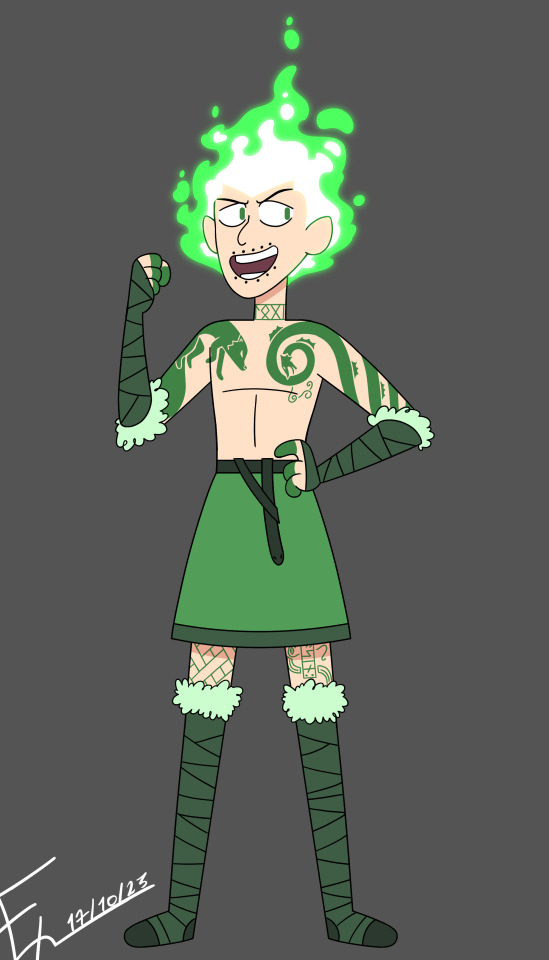



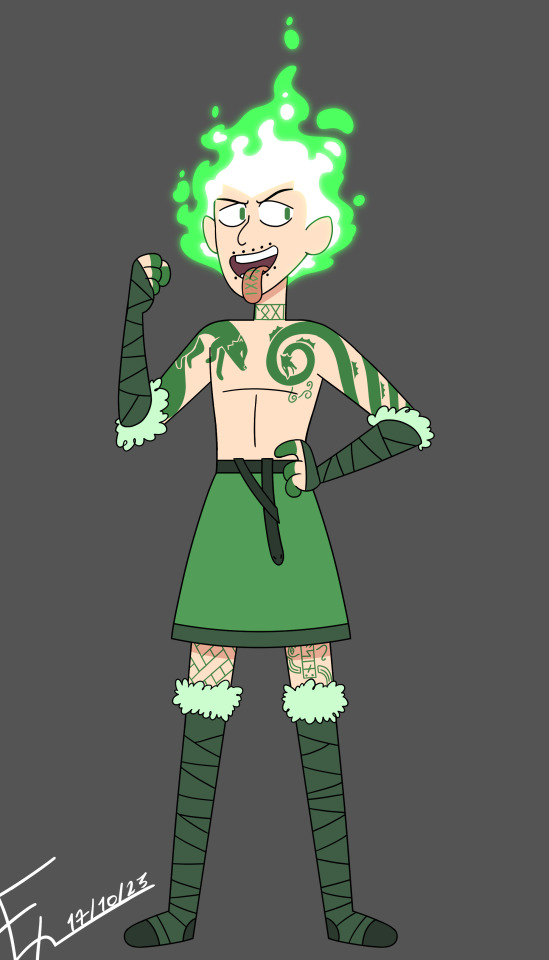
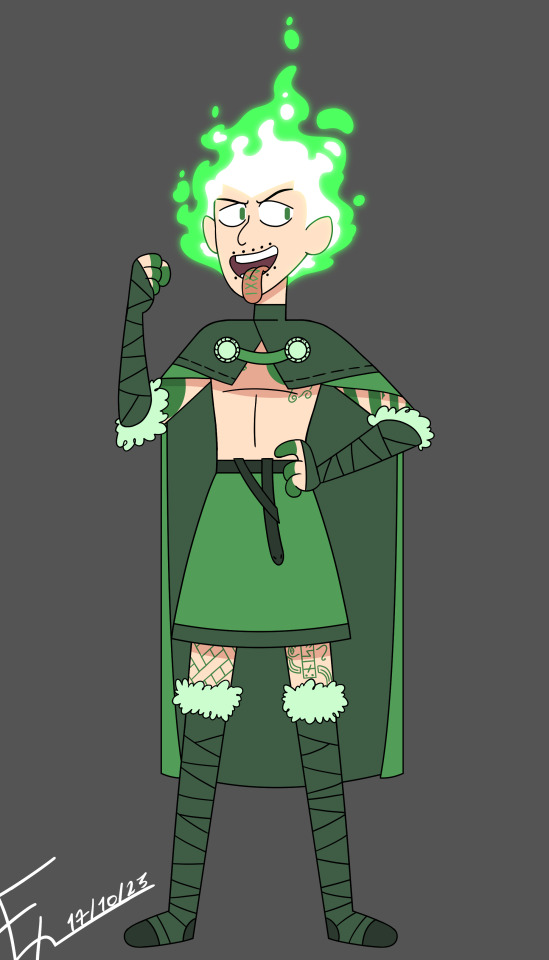
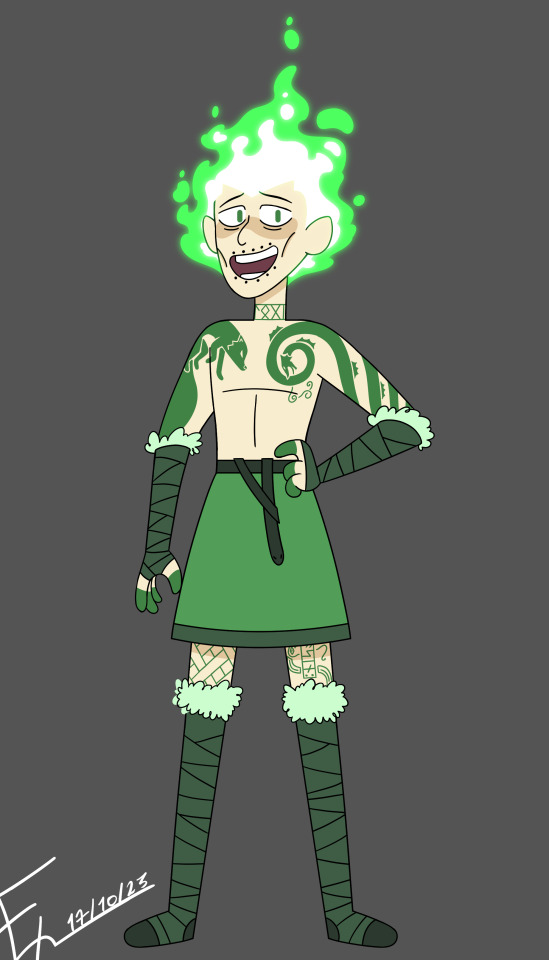

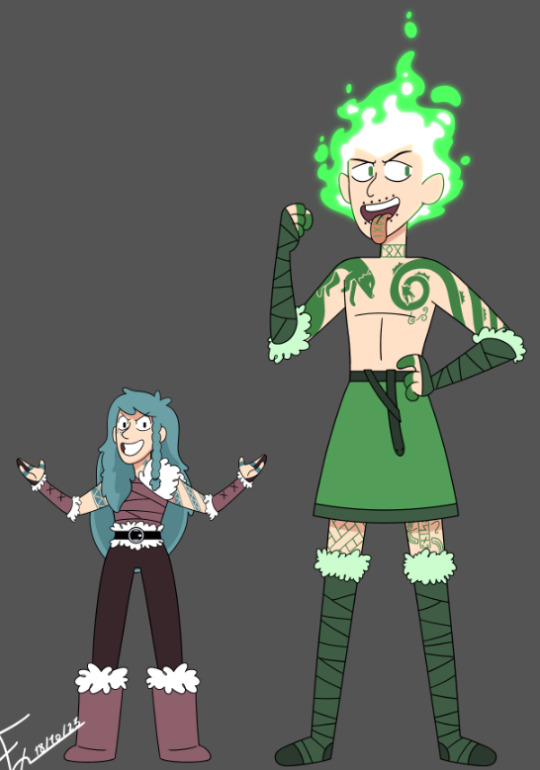
THE GOD OF MISCHIEF AND FIRE IS HERE!!! Loki is finally updated! Now he looks waaay better (and more androgenous :v) than before, now with even some tattoos!
Son of Fárbauti with Laufey, Loki was brother of Býleistr (which was also known as Thor and the giant father of wather spirits) and was "born" when his father struck his mother, causing a wildfire. From it, he took form. Loki had always been jealous of his brother, and when the dwarves Eitri and Brokkr decided to make the hammer Mjölnir for Býleistr, Loki decided to disrupt the forging but although succeeding with it and making the warhammer's handle smaller for such a gigantic hammerhead, Býleistr was fascinated by the hammer and could wield it even with such a disparity in weight.
Loki was fuming in rage and when a young god, Perkwunos, wanted the hammer for himself, Loki helped the young god achieving the god's goal, but his envy and jealousy blinded him to see though Perkwunos's intention. When the god held the hammer in his hand, he did not waste time on slaying Loki's brother in cold-blood, taking for himself the magic of weather spirits and Býleistr's title "Thor".
After that, the young god now named Thor threatened Loki into tricking Eitri and Brokkr to make for the thunder god a way to use the hammer with ease (due to its weight and small handle), and so the "járngreipr" were forged. Upon discovering about the trick, Eitri and Brokkr captured Loki and sewn his mouth shut "so he could not spread any more lies".
His other stories where he lied, tricked the gods and giants and even helped in the killing of Baldr led him into being hunted and captured by Váli Odinson, the god born with the sole purpose of capturing Loki, and bounding the trickster god into a rock with Loki's own daughter's guts, and the most venomous snake to spit its venom on the god's face for eternity. If not by Sigyn, his lover, who holds a bowl below the snake's mouth, Loki would be forever suffering and even if from time to time Sigyn has to let the venom drip on his lover everytime she empties the bowl, causing him to spasm and causing Midgard to shake, he would not have chosen any other one to spend his eternity with.
FINALLY HE IS DONE! I wanted so much to redesign him and I finally could BUT if you think he's the last redesigned OC Imma post, you're wrong >:D some Valkyries were also redesigned too and WILL be posted first on my P4TR30N so if any of you want check it out, it will be worth your money :D
OLD LOKI
#hilda#hilda netflix#hilda the show#hilda the series#hilda fanart#hilda au#au#alternate universe#oc#original character#loki#god of mischief#god of fire#lævateinn#medallion#wand#witch#hilda and the allmother#hilda and the all-mother#exjr original
28 notes
·
View notes
Text
July for Loki using 30 Days of Deity Devotion prompts, Day 5 • Members of the family – genealogical connections
Loki Laufeyjarson, Loki Son of Laufey. Laufey is Loki's mother: Laufey the leafy Ásynja (female Æsir), Laufey the Birch set on fire by the mighty Jötunn Fárbauti, the Lightning that strikes and brings the flames to the ground. According to this myth, Loki is of Jötunn and Æsir blood, belonging to both worlds and none at the same time, making him a liminal being from the very beginning. I personally feel Laufey is originally a J��tunn, later included among the Ásynja, but it's an UPG (unverified personal gnosis). Laufey gave birth to two other children, Helblindi and Býleistr, Loki's brothers. Sigyn is Loki's wife, and little is known about her. According to my own feeling, she belongs to the Jötnar too, but it's another UPG. Together they have two sons, Narfi and Váli. The Lady of Járnvid (Ironwood), Angrboða, conceived three powerful children with Loki: Hela, Queen of the Dead; Fenrisúlfr, the Wolf Fenrir; Jörmungandr, Miðgarðsormr, the Sea Serpent that hugs Miðgarð. To all of these children, Loki is father. And yet there is another children, too often forgotten, to which Loki is mother: Sleipnir, the eight-legged horse he conceived in the form of a mare with the stallion Svaðilfari. You may be familiar with Sleipnir being Óðinn's mount. Óðinn is also Loki's blood brother by oath, another detail some prefer to forget. Their relationship may be complex, but if we wanna talk about Loki's connections it seems only fair to me to include his good old friend Grímnir (Hooded, Masked One), too.
When Loki chooses to "work" with you, he'll introduce you to his family, sooner or later, in no particular order. He's a family person, and just loves his dear ones, especially his children, with all his burning heart.
Art by @muirin007 , love this depiction of Loke with his kids!
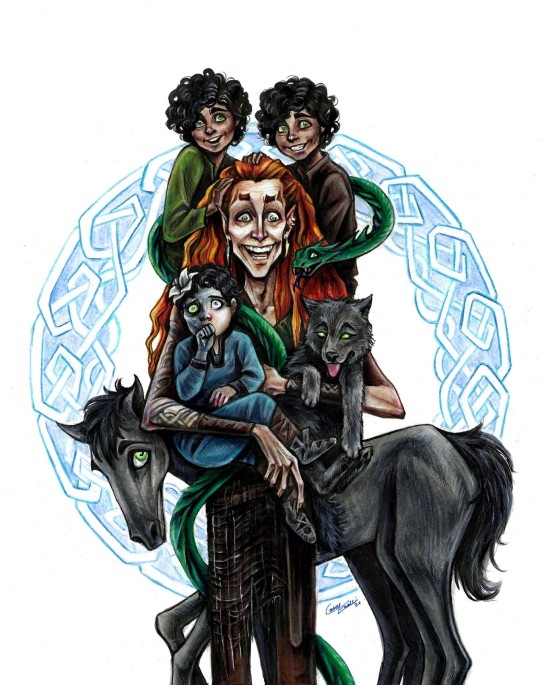
#loki#norse loki#loki laufeyjarson#laufey#farbauti#angrboda#sigyn#narfi#vali#fenrir#hela#jormungandr#norse paganism#livin la vida loka
36 notes
·
View notes
Text
Loki's mask pendant
Loki is the Norse god of fire, as well as trickster. He is the son of two giants, Fárbauti (cruel striker) and Laufey (or Nál which means "needle", implying that she was skinny and weak.). His two brothers (in which were to be beside him in Ragnarok) are Býleistr (bee-lighting) and Helblindi (All blind or hel-blinder). He is referred to as the blood-brother of Odin. Loki becomes harbinger of Ragnarok and the father of the three chaos monsters: Fenrir, Jörmungandr, and Hel.
#berloga_workshop#vikingjewelry#exclusivejewelry#likeaviking#vikingstyle#norse#handmade#silverwork#crafts#silversmith#Loki#Lokimask#mask#vikingdesign#vikingart#pendant#replica#etsyseller#etsystore#etsy#etsyshop#EtsyStarSeller
4 notes
·
View notes
Note
Something interesting to see both in the MCU and in the comics, would be Loki's brothers Helblindi and Býleistr, it would really make for an interesting plot and drama.
Yeah, admitting a bit of untapped potential there. Granted a lot of Loki's family is under used by Marvel
3 notes
·
View notes
Text
Loki

Loki is a god in Norse mythology. According to some sources, Loki is the son of Fárbauti (a jötunn) and Laufey (mentioned as a goddess), and the brother of Helblindi and Býleistr. Loki is married to Sigyn and they have a son, Narfi and/or Nari. By the jötunn Angrboða, Loki is the father of Hel, the wolf Fenrir, and the world serpent Jörmungandr. Loki, in the form of a mare, was impregnated by the stallion Svaðilfari and gave birth to the eight-legged horse Sleipnir. Loki is referred to as the father of Váli in Prose Edda, though this source also refers to Odin as the father of Váli twice, and Váli is found mentioned as a son of Loki only once.
Loki's relation with the gods varies by source; Loki sometimes assists the gods and sometimes behaves maliciously towards them. Loki is a shape shifter and in separate incidents appears in the form of a salmon, a mare, a fly, and possibly an elderly woman named Þökk (Old Norse 'thanks'). Loki's positive relations with the gods end with his role in engineering the death of the god Baldr, and eventually, Váli binds Loki with the entrails of one of his sons. In both the Poetic Edda and the Prose Edda, the goddess Skaði is responsible for placing a serpent above him while he is bound. The serpent drips venom from above him that Sigyn collects into a bowl; however, she must empty the bowl when it is full, and the venom that drips in the meantime causes Loki to writhe in pain, thereby causing earthquakes. With the onset of Ragnarök, Loki is foretold to slip free from his bonds and to fight against the gods among the forces of the jötnar, at which time he will encounter the god Heimdallr, and the two will slay each other.
Loki is referred to in the Poetic Edda, compiled in the 13th century from earlier traditional sources; the Prose Edda and Heimskringla, written in the 13th century by Snorri Sturluson; the Norwegian Rune Poems, in the poetry of skalds, and in Scandinavian folklore. Loki may be depicted on the Snaptun Stone, the Kirkby Stephen Stone, and the Gosforth Cross. Scholars have debated Loki's origins and role in Norse mythology, which some have described as that of a trickster god. Loki has been depicted in or is referenced in a variety of media in modern popular culture.
3 notes
·
View notes
Text
Valyard
Born as the eldest twins to King Laufey and Queen Fárbauti, Býleistr and Helblindi were believed to be two souls split under the moon of the matron goddess Máni and the sun of the patron god Sol.
However, it was their eldest brother Býleistr that was Jotunheimr's promised King. A man of great sorcery and prowess, he would be Loki's mentor and most loved brother.



Helblindi was considered their great oracle, born under the Moon of Máni and considered their high priestess of the New Moon; an annual tradition celebrating good harvest, and the new year. She, for many, was reveared placed on a mantle of highest standards.
Loki was the youngest but was no more loved than the twins who held prestige and reverence. He was closest to his eldest brother. The two of them would hunt, spar, and learn magic together.
Helblindi prophesized Asgard's crusade against the 9 realms in order to unify them under Odin's iron fist. This forced their mounting tensions to its boiling point. Jotunheimr secretly prepared their armies for the impending assault.
Bylestr lead the army in its training and coordinated their stealth missions to gather Asgardian intelligence.
Loki had his own mission, he sought out magic and power. Sorcery was his ambition and weapon of choice. He like many of the other 9 realms wanted to stay independent. Odin proved time and again that he was a warlord; to unify under his laws and beliefs would strip away their peoples autonomy.
His travels were eye opening to him. Asgard's crusade was a glimpse into a greater threat an incursion that would rewrite the fabric of time and space.
Traveling through the 9 realms, Loki forged an alliance with the powerful midgardian sorceress, Morgan Le-Fey, along with a space pirate couple and the elven prince Forsetti. Their knowledge of magic and Yggdrasil's life force gave Loki the chance to infiltrate Asgard and cripple Odin's armies before they struck.
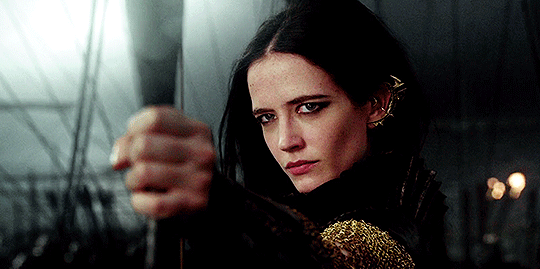

War-Queen & The Elven King
Morgan Le-Fey was the sorceress supreme of the early 12th century. She was seen as a radical for her efforts to bring equality to women and pagan practitioners.
Her reign in Avalon was cut short by Odin's crusade, however, her influence set the foundation for many women's rights movements that followed.
The Star Gliders



Meiying was the captain of an all female tactical strike force. The Star Gliders, as she called them, went behind enemy lines to eliminate high profile threats. She and her crew joined Loki's mission to protect the 9 Realms from Odin's tyranny.
0 notes
Text
⏤͟͟͞͞ day 5 of 30 days of devotion to loki ♡
day 5 : deities family members
(20th july)
Loki is the some son of Fárbauti, whom is a jötunn - and Laufey, mentioned as a goddess. his brothers are Helblindi and Býleistr. Loki is married to Sigyn and they have two sons, Narfi/Nari and Váli! Loki is also credited with giving birth to Sleipnir who is Odin's eight-legged horse.
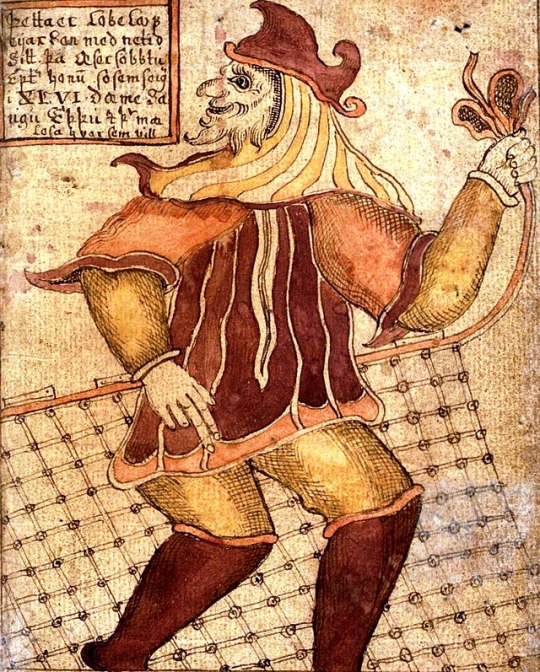
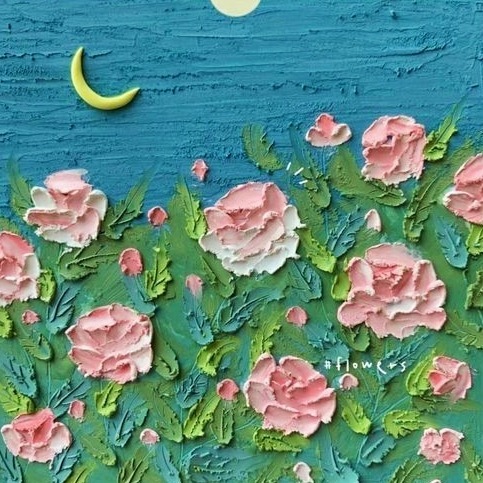
0 notes